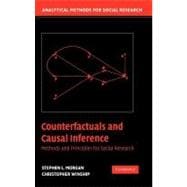
| Counterfactual Causality and Empirical Research in the Social Sciences | |
| Introduction | |
| The counterfactual model | |
| Estimating Causal Effects by Conditioning | |
| Causal graphs, identification, and models of causal exposure | |
| Matching estimators of causal effects | |
| Regression estimators of causal effects | |
| Estimating Causal Effects When Simple Conditioning is Ineffective | |
| Identification in the absence of a complete model of causal exposure | |
| Natural experiments and instrumental variables | |
| Mechanisms and causal explanation | |
| Repeated observations and the estimation of causal effects | |
| Conclusions | |
| Counterfactual causality and future empirical research in the social sciences | |
| Table of Contents provided by Publisher. All Rights Reserved. |
The New copy of this book will include any supplemental materials advertised. Please check the title of the book to determine if it should include any access cards, study guides, lab manuals, CDs, etc.
The Used, Rental and eBook copies of this book are not guaranteed to include any supplemental materials. Typically, only the book itself is included. This is true even if the title states it includes any access cards, study guides, lab manuals, CDs, etc.